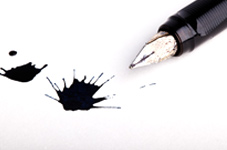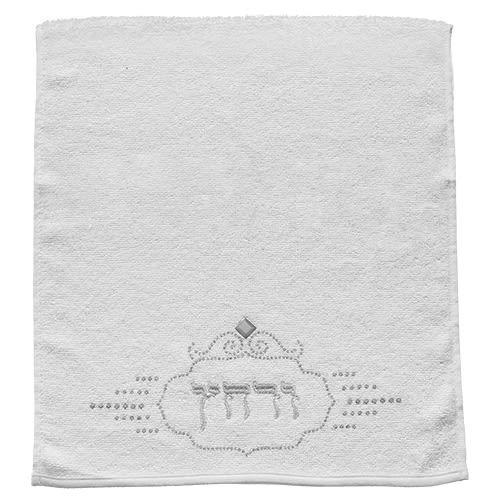
Indelible Ink
Hashem blessed most of us with the ability to converse, but like the permanent marker, Loshon hara can cause irreparable damage well beyond our intentions. …

“Who is the man that desires life, and loves days, that he may see the good therein? Guard your tongue from evil and your lips from speaking deceitfully.” (Tehillim 34:13-14)
When I was a child, we had a very special pen that was kept in my mother’s sewing box. I was instructed not to touch it since it contained a type of ink that would never come out if you wrote on something with it. It had a ‘big’ name I had never heard of before (in all my 5 or 6 years of life) – indelible ink!
I was told that we had to be very careful with it because if it was used incorrectly, it would leave a mark that would remain permanently. I got the impression this was serious business so I kept my distance from the strange pen.
Until a certain age I abided by the rules without question but as I got older, I pushed the boundaries, occasionally thinking I knew better. What would it hurt to use an indelible pen to draw some pictures on paper? In my naivety, I failed to put something under the paper and I as a result, I succeeded in ruining the  table top I was working on. Not only that, but the design was not clear as the lines of ink spread into the paper as it absorbed in all directions.
table top I was working on. Not only that, but the design was not clear as the lines of ink spread into the paper as it absorbed in all directions.
This recounting is an allegory for loshon hara. Loshon hara, literally translated as “evil tongue”, is the term we use for tale-bearing, although it can apply to any manner of speech whether it is derogatory or not. We need not speak badly about someone to be guilty of loshon hara, but to simply talk about them at all is wrong, even if it is true. It also applies to discussions about organizations, companies or other groups.
Hashemblessed most of us with the ability to converse, but like the permanent marker, if great care is not taken, Loshon hara can cause irreparable damage well beyond our intentions. Even if it is an innocent mistake, it is a very dangerous transgression which can destroy on three levels. First, the person (holding the pen) who is speaking is already culpable for not guarding her tongue. The victim being spoken about (the paper with the design) is harmed simply by the words being shared about him. The parties who are listening to this gossip are also affected (stained table) as they are tarnished by the sin as well.
All this destruction simply because we chose not to listen to our parents! Our Father in Heaven gave us guidelines to live by yet we think we know better. We say to ourselves, what does it matter? I want to get it off my chest, I need to share, no one will know. Chances are it will eventually get back to the target of the verbal abuse and be very hurtful. Regardless, the bottom line is, SomeOne does know, and sees all. We are commanded not to participate in this act whether we agree or not.
Failure to comply with the laws of Loshon Hara is a very grave sin and the stain one finds on his or her soul is almost as permanent and disastrous as the ink from an indelible pen. But there is one redeeming reality in the spiritual world; we have the ability to do tshuva (repent). For evil speech however, we must not only apologize to Hashem for the misdeed, but go directly to the person we spoke about and ask forgiveness from them. When all is said and done, is it worth the few seconds of ‘pleasure’ we get from slandering someone?
The laws of Loshon Hara are so complex and extensive that volumes have been written on the subject. The most well-known is the Chofetz Chaim whose writings were adapted into several popular books including “Guard Your Tongue” (Rabbi Zelig Pliskin) and “Chofetz Chaim, A Daily Companion” (arranged by Rabbi Yehuda Zev Segal, zt’l).
It’s not our fault, though. The yetzer hara (evil inclination) has been seducing us to fall into this trap from the beginning of time since the snake convinced Eve to eat from the forbidden tree, contradicting Hashem’s words. Loshon hara can cause jealousy, hatred and so many other ill feelings. Through speaking Loshon Hara, a person raises the rest of his sins to the severity of the Three Cardinal Sins (Sefer Hamidot, Loshon Hara 2). This refers to the three mitzvot (commandments) that we should give our lives for rather than transgress; murder, forbidden sexual relations and worshipping other gods. A pretty major indiscretion, to say the least.
We learn we will not be worthy of Hashem’s blessing as long as we continue on this path. Still, we must understand that Hashem would not ask us to do something that is beyond our reach. We CAN overcome and we do have the ability to create a different atmosphere. It occurs hand in hand with unity. By loving each other as ourselves (Rabbi Akiva) we will be able to refrain from idle chatter, overturning the baseless hatred. It’s easy to see faults in others but are we really just looking in the mirror? Maybe it’s time to work on ourselves rather than criticizing others and b’ezrat Hashem, (with G-d’s help) we will soon see only Godliness indelibly etched into our souls.










Tell us what you think!
Thank you for your comment!
It will be published after approval by the Editor.